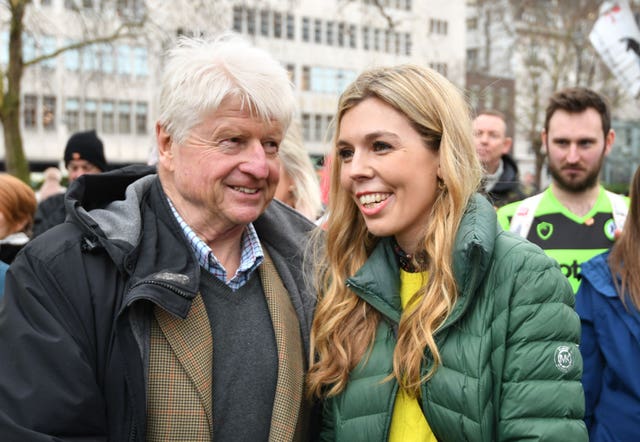Boris Johnson’s father joins protest over Japanese whaling
Mr Johnson and Ms Symonds were spotted smiling and chatting together after they both addressed the crowd.

Boris Johnson’s father and reported partner were among protesters at an event opposing Japan’s plans to resume commercial whaling.
Stanley Johnson and ocean conservationist Carrie Symonds, who is reported to be Boris’s girlfriend, were speakers at the anti-whaling protest in central London on Saturday.
Japan took the decision in December to leave the International Whaling Commission, and this week Japanese whalers were discussing plans to start commercial hunting along the north-eastern coasts for the first time in three decades.
Mr Johnson and Ms Symonds were spotted smiling and chatting together after they both addressed the crowd.
Speaking to the Press Association beforehand, Ms Symonds said: “I think that whaling is incredibly cruel. There’s no two ways about it. And the main reason often given for whaling is that it’s tradition.
“But I think that this is the kind of tradition that should remain in the dustbin of history.
“Quite frankly we’ve all seen the pictures of whales being slowly killed with the sea turning red with blood as they’re harpooned.
“It’s violent. It’s disgusting. And these are some of the most endangered and intelligent and beautiful creatures we have.”

She added: “How about we start a new tradition today? And instead we have a tradition where we protect these animals, we respect these animals and we recognise how lucky we are to live alongside these animals.”
When asked whether Boris Johnson would be joining her at the protest she declined to comment.
Speaking before he addressed the crowd, Stanley Johnson said: “There’s no humane way to kill a whale, no humane way. So there’s a huge task in front of us now.
“The Japanese have said they’re going to withdraw in July from the International Whaling Commission.

“We must appeal to them not to do that. We must appeal to them not to start commercial whaling again.
“And I think we have to be ready to say: ‘Look, if you do go on, then there will be sanctions’.”
Dominic Dyer, from the Born Free Foundation, was the main organiser of the protest which drew a crowd of a few hundred.
He said the protest was held due to Japan’s decision to leave the International Whaling Commission and to go back to whaling from the beginning of July.
“We think this sets a dangerous precedent for other countries to follow,” he said, adding: “We could see South Korea break out of the IWC, and China break out of the IWC.

“We have serious worries that the geographical area that Japan will hunt whales in is a migration route and a movement route for many whales, including many endangered species.”
He added: “We’re starting what we hope is a global movement in London that will see similar protests in America, Australia, Canada… and we hope this will generate huge public and political opposition to make the Japanese government change its mind.”
The demonstration began in Cavendish Square followed by a march to the Embassy of Japan on Piccadilly.





